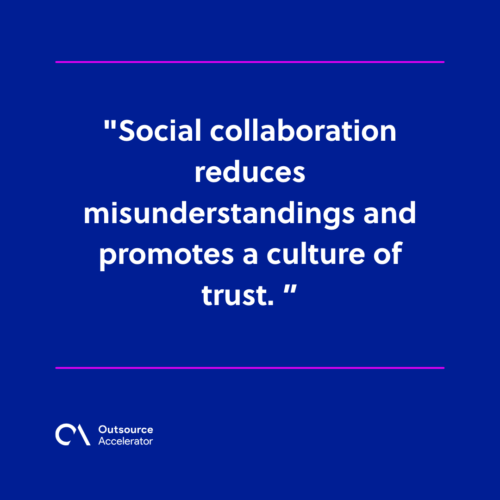Understanding social collaboration and its benefits

Social collaboration is revolutionizing the way individuals and teams work together.
Propelled by rapid technological evolution and the shift towards remote work, social collaboration transcends traditional notions of teamwork.
When businesses recognize the power of collective intelligence, they turn to social collaboration platforms to foster innovation, streamline communication, and drive productivity. It’s reshaping how we collaborate, ensuring every idea is heard and no valuable input is missed.
This article explores the transformative potential of social collaboration and some practices you can implement to bring this experience into your virtual workplace.
What is social collaboration?
Social collaboration refers to the practice of people working together, sharing knowledge, and exchanging ideas in a digital environment. It encompasses a range of tools and platforms, including social networking, online communities, and collaborative software.
Social collaboration aims to extend beyond physical boundaries. It enables people to conspire in real time, regardless of geographical location.
With a more open and inclusive approach to working together, social collaboration enhances teamwork, fosters innovation, and improves overall productivity.

Social collaboration practices to try this 2024
The realm of social collaboration offers innovative practices that can significantly enhance teamwork, productivity, and employee engagement.
Here are social collaboration practices to consider integrating into your organizational strategy:
Virtual collaboration spaces
Providers create virtual collaboration spaces where employees from different departments and locations can come together. In these spaces, they can share ideas, ask questions, and participate in projects.
Ensure these spaces are easily accessible and encourage engagement.
Knowledge-sharing initiatives
Inspire employees to share their knowledge and expertise through different channels, like blogs or webinars. This encourages a culture of cooperation and ongoing learning.
Cross-department collaboration
Encourage cross-department collaboration by organizing interdepartmental projects and cross-functional teams.
This helps break down silos and supports social collaboration across different parts of the organization. Set clear objectives, provide adequate resources, and establish efficient communication channels.
Emotional intelligence training
Prioritize training programs focused on emotional intelligence in virtual and collaborative environments. This helps team members navigate diverse communication styles and build stronger interpersonal relationships.
Social recognition and rewards
Implement a social recognition platform that allows employees to recognize and appreciate their peers for their contributions. This creates a positive and collaborative work culture where people feel valued and motivated to support each other.
Gamification of collaboration
Incorporate elements of gamification into collaboration processes to make them more engaging and fun. It could include reward systems, leaderboards, and interactive challenges to incentivize and recognize collaborative achievements.

Hybrid collaboration models
Embrace hybrid collaboration models that seamlessly integrate both in-person and remote work. This ensures that teams can collaborate effectively regardless of physical location, fostering flexibility and work-life balance.
Third-party solutions providers like Cloudstaff tackle this head-on, providing both cutting-edge office facilities and the technology to properly manage remote workforces.
Successful implementation of social collaboration practices requires clear communication, training, and ongoing support. It’s important to involve employees and seek their input to ensure effective adoption and engagement.
Exploring and implementing these social collaboration practices enables organizations to stay at the forefront of collaborative innovation. These practices can help foster a dynamic and adaptive workplace culture in 2024 and beyond.
Benefits of social collaboration
Adopting social collaboration within the framework of your company yields a multitude of benefits, including the following:
Increased productivity
Social collaboration platforms streamline communication, which reduces reliance on lengthy email threads. This results in more rapid information exchange, allowing faster decision-making processes, preventing bottlenecks, and increasing productivity.
Strategic alignment
Collaboration tools help align individual efforts with organizational goals. Team members can better understand how their contributions fit the broader strategic vision, fostering a sense of purpose.
Enhanced creativity and innovation
Social collaboration breaks down silos, enabling individuals from diverse departments to share insights. This cross-pollination of ideas often sparks creativity and leads to innovative solutions.
Improved communication and team dynamics
Social collaboration reduces misunderstandings and promotes a culture of trust. Platforms that allow transparent communication ensure that everyone is on the same page.
They also serve as “virtual water coolers,” fostering informal interactions that build camaraderie and strengthen team bonds.

Knowledge sharing and learning
Social collaboration platforms often include document sharing and storage capabilities, creating centralized knowledge repositories. This makes information easily accessible to team members and helps avoid redundant work.
Collaborative environments also allow for skill-sharing and peer learning, contributing to professional development.
Agile project management
These platforms provide real-life updates on project progress, task completion, and potential roadblocks.
Teams can swiftly adapt to changes or unforeseen challenges by leveraging social collaboration’s collective intelligence and flexibility.
Global collaboration opportunities
Social collaboration transcends geographical constraints, enabling seamless teamwork across different locations. This facilitates the formation of diverse, globally connected teams.
Fostering a healthy work environment through social collaboration
In the synergy of minds, the fluidity of ideas, and the harmony of collaboration, businesses find not just success but a fulfilling and sustainable path forward.
Social collaboration should not just be a buzzword but a strategic imperative. By embracing social collaboration practices, you can create a healthy work environment where employees feel valued, heard, and supported.







 Independent
Independent




